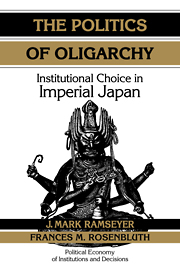Book contents
- Frontmatter
- Contents
- List of tables and figure
- Series editors' preface
- Acknowledgments
- CHAPTER 1 INTRODUCTION
- CHAPTER 2 THE COLLAPSE OF OLIGARCHY: FAILED ATTEMPTS AT CARTEL-MAINTENANCE
- CHAPTER 3 CONCESSION OR FACADE: THE MEIJI CONSTITUTION
- CHAPTER 4 ELECTORAL RULES AND PARTY COMPETITION: THE STRUGGLE FOR POLITICAL SURVIVAL
- CHAPTER 5 THE BUREAUCRACY: WHO RULED WHOM?
- CHAPTER 6 THE COURTS: WHO MONITORED WHOM?
- CHAPTER 7 THE MILITARY: MASTER OF ITS OWN FATE
- CHAPTER 8 FINANCIAL POLITICS
- CHAPTER 9 RAILROAD POLITICS
- CHAPTER 10 COTTON POLITICS
- CHAPTER 11 CONCLUSION: INSTITUTIONS AND POLITICAL CONTROL
- Notes
- References
- Index
CHAPTER 11 - CONCLUSION: INSTITUTIONS AND POLITICAL CONTROL
Published online by Cambridge University Press: 05 June 2012
- Frontmatter
- Contents
- List of tables and figure
- Series editors' preface
- Acknowledgments
- CHAPTER 1 INTRODUCTION
- CHAPTER 2 THE COLLAPSE OF OLIGARCHY: FAILED ATTEMPTS AT CARTEL-MAINTENANCE
- CHAPTER 3 CONCESSION OR FACADE: THE MEIJI CONSTITUTION
- CHAPTER 4 ELECTORAL RULES AND PARTY COMPETITION: THE STRUGGLE FOR POLITICAL SURVIVAL
- CHAPTER 5 THE BUREAUCRACY: WHO RULED WHOM?
- CHAPTER 6 THE COURTS: WHO MONITORED WHOM?
- CHAPTER 7 THE MILITARY: MASTER OF ITS OWN FATE
- CHAPTER 8 FINANCIAL POLITICS
- CHAPTER 9 RAILROAD POLITICS
- CHAPTER 10 COTTON POLITICS
- CHAPTER 11 CONCLUSION: INSTITUTIONS AND POLITICAL CONTROL
- Notes
- References
- Index
Summary
INTRODUCTION
Power-seeking entrepreneurs cooperated with one another long enough to overthrow the Tokugawa regime and to install themselves in its place. But as they jockeyed for position in the new government, they eventually forfeited power to party politicians. All too soon, however, events turned as sour for Japan's budding democracy as they had for oligarchy. The military took over; not, we argue, because politicians were inept or because the Japanese public was unready for democracy. Instead, we blame the oligarchs for establishing an institutional structure – including, in particular, the independence of the military – that was designed to protect at least some of the oligarchs themselves. While it may have done that, it ultimately destroyed Japan's first experiment with electoral government.
In the course of this book, we make two principal claims. First, we argue that institutions in pre-war Japan became dysfunctional to all but the military, even though the military was not the group the institutions were designed ultimately to protect. The oligarchs fashioned the institutions as tools for their own purposes. Once established, however, they constrained the behavior of the oligarchs themselves, as well as the choices of successive groups of political party leaders. Institutions may be, as they were in pre-war Japan, costly to change. In Japan's case, the Meiji Constitution and its attending process of decision-making launched a chain of events that was nothing short of catastrophic for the Japanese public.
- Type
- Chapter
- Information
- The Politics of OligarchyInstitutional Choice in Imperial Japan, pp. 160 - 172Publisher: Cambridge University PressPrint publication year: 1995



